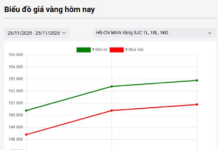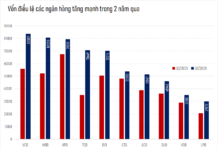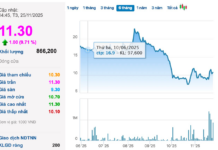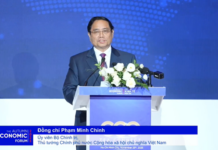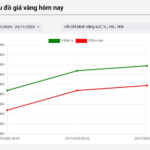On the morning of November 25th, the National Assembly reviewed the draft Resolution on the investment policy for the National Target Program on Healthcare, Population, and Development for the 2026-2035 period.
Presenting the proposal, Minister of Health Dao Hong Lan stated that the program’s total estimated budget for the 2026-2030 phase is VND 88,635 billion. This includes VND 68,000 billion from the central budget and VND 20,041 billion from local budgets.
For the 2031-2035 phase, the projected budget is VND 36,843 billion.
Thus, the total budget for the entire 2026-2035 period is approximately VND 125,478 billion.
The program will span 10 years, from 2026 to 2035, divided into two phases: 2026-2030 and 2031-2035.

Minister of Health Dao Hong Lan. Photo: Nhu Y
The overarching goal of the program is to enhance physical and mental health, stature, life expectancy, and quality of life for the population; ensuring all citizens receive quality primary healthcare management.
The program aims to empower individuals to proactively manage and improve their health, reduce illnesses through early and remote prevention at grassroots levels, address priority population issues, adapt to population aging, enhance population quality, and strengthen care for vulnerable groups. This contributes to building a healthy and prosperous Vietnam in the new era.
Specific objectives include increasing the proportion of communes, wards, and special zones meeting the National Criteria for Communal Healthcare to 90% by 2030 and 95% by 2035. By 2030, 100% of the population will have digital health records and lifecycle health management, maintained through 2035.
Ensuring Adequate Minimum Funding Allocation
Another critical goal is ensuring that by 2030, 100% of provincial and city Centers for Disease Control (CDC) have the capacity to test for pathogens, antigens, and antibodies of dangerous infectious diseases, as well as assess clean water quality and school sanitation.
By 2030, 100% of communal health stations nationwide will fully implement prevention, management, and treatment of certain non-communicable diseases according to guidelines, maintained through 2035.
The birth rate is expected to increase by 0.5% by 2030 compared to 2025 and by an additional 0.5% by 2035 compared to 2030. The proportion of couples receiving premarital health counseling and check-ups will reach 90% by 2030 and 95% by 2035.
Additionally, the number of vulnerable individuals accessing and utilizing services at social care facilities will increase by 70% by 2030 compared to 2025 and by 90% by 2035 compared to 2030.
Reviewing the project, Nguyen Dac Vinh, Chairman of the Committee on Culture and Society, suggested adding persons with disabilities as a priority group in the program.
Regarding the total budget, the reviewing agency recommended the Government clearly identify funding sources, ensure adequate minimum funding allocation, and maintain a reasonable balance between the program’s two key objectives: healthcare and population development.
The agency also urged the Government to closely assess local budget mobilization capabilities and propose more realistic local budget allocations, especially for localities facing challenges in matching funds.
For program projects, the agency recommended reviewing and selecting core, critical content to avoid resource wastage and dispersion.
Minister Đào Ngọc Dung: Forging a Visionary Legacy
This title hints at a story about a minister with a forward-thinking mindset, who plans with a long-term vision in mind. It evokes a sense of strategic thinking and a desire to create a lasting impact.
Minister of Home Affairs and Religion, Dao Ngoc Dung, emphasized the importance of long-term vision in decision-making and action. He stressed that every decision and action taken today must consider its effectiveness and impact in the distant future, rather than just solving immediate problems. Mr. Dung encouraged a mindset of legacy and impact, urging individuals to contemplate the mark they will leave on their industry and nation. “Think ten years ahead with every day’s work,” he emphasized.
Unlocking the Potential of Vietnam’s Bauxite Resources: A Comprehensive Report for the Prime Minister’s Office
Vice Prime Minister Tran Luu Quang instructed the Ministry of Natural Resources and Environment to scrutinize the Mineral Law currently under amendment and supplementation. He emphasized ensuring that the law does not hinder local authorities when implementing national key projects and public investment projects.
Unlocking Economic Growth: Prioritizing Mountainous Infrastructure in Binh Dinh
The mountainous district of Vinh Thanh in Binh Dinh Province is focusing on implementing the National Target Program for Socio-Economic Development in Ethnic Minority and Mountainous Areas for the period of 2021-2030. The local authorities are prioritizing essential infrastructure development to facilitate transportation and trade of agricultural products for the ethnic minority communities, thereby improving their livelihoods and overall well-being.






